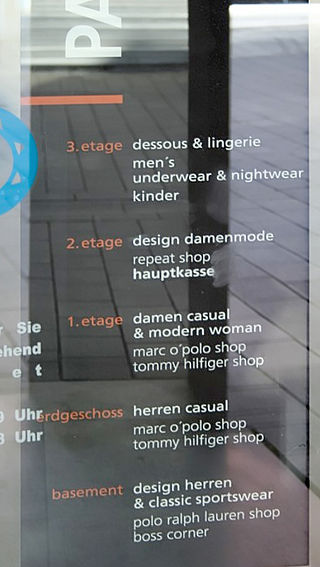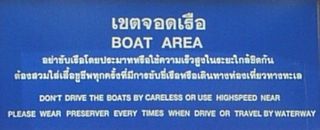Vietglish, Vinglish or Vietlish, is an informal term for a mixture of elements from Vietnamese and English.

Denglisch is a term describing the increased use of anglicisms and pseudo-anglicisms in the German language. It is a portmanteau of the German words Deutsch (German) and Englisch. The term is first recorded from 1965.

Tinglish refers to any form of English mixed with or heavily influenced by Thai. It is typically produced by native Thai speakers due to language interference from the first language. Differences from standard native English occur in pronunciation, vocabulary, and grammar. The term was coined in 1970, and several alternative terms have been proposed since its inception, such as Thainglish (1973), Thaiglish (1992), Tinglish (1994), Thinglish (1976), Thenglish (2003), and Tenglish (2012).
Swenglish is a colloquial term referring to the English language heavily influenced by Swedish in terms of vocabulary, grammar, or pronunciation.
Dunglish is a popular term for an English spoken with a mixture of Dutch. It is often viewed pejoratively due to certain typical mistakes that native Dutch speakers, particularly those from the Netherlands, make when speaking English. The term is first recorded in 1965, with other colloquial portmanteau words including Denglish, Dutchlish (1986), and Dinglish (2003).
Siculish is the macaronic "Sicilianization" of English language words and phrases by immigrants from Sicily (Italy) to the United States in the early 20th century. The term Siculish is, however, rather recent, being first recorded in 2005.
Arablish is slang for code-switching between the two languages or macaronically using features of one in the other. The term is first recorded in 1984. It is alternatively termed Arbalizi, a portmanteau combining the words Arabic and Inglizi.
Namlish is a form of English spoken in Namibia. The term was first recorded in 1991.

Czenglish, a portmanteau of the words Czech and English, refers to the interlanguage of English heavily influenced by Czech pronunciation, vocabulary, grammar or syntax spoken by learners of English as a second language. The term Czenglish is first recorded in 1989, with the slightly earlier variant Czechlish recorded from 1982.
Poglish, also known as Polglish and Ponglish, is a blend of two words from Polish and English. It is the product of macaronically mixing Polish- and English-language elements within a single speech production, or the use of "false friends" or of cognate words in senses that have diverged from those of the common etymological root. Such combining or confusion of Polish and English elements, when it occurs within a single word, term, or phrase, may, inadvertently or deliberately, produce a neologism.
Maltenglish, also known as Manglish, Minglish, Maltese English, Pepè or Maltingliż refers to the phenomenon of code-switching between Maltese, a Semitic language derived from late medieval Sicilian Arabic with Romance superstrata, and English, an Indo-European Germanic language.
Porglish or Portugish is the various types of language contact between Portuguese and English which have occurred in regions where the two languages coexist. These range from improvised macaronic admixture of and code-switching between the languages by bilingual and partially bilingual users, to more-or-less stable patterns of usage.
Jewish English is a cover term for varieties of the English language spoken by Jews. They may include significant amounts of vocabulary and syntax taken from Yiddish, and both classical and modern Hebrew. These varieties can be classified into several types: Yeshivish, Yinglish, and Heblish, as well as more flexible mixtures of English and other Jewish languages, which may contain features and other elements from languages other than Yiddish and Hebrew.
Tenglish, refers to various mixings of the Telugu and English languages.
Turklish, a portmanteau of "Turkish (Türkçe)" and "English (İngilizce)", refers to the language contact phenomenon that occurs primarily where native Turkish speakers frequently communicate in English. The term is first recorded in 1994. The term does not refer to English spoken with a Turkish accent, but rather to code switching between the two languages.
Bislish is a portmanteau of the words Bisaya and English, which refers to any of the Visayan languages of the Philippines macaronically infused with English terms. It is an example of code mixing. The earliest use of the term Bislish dates from 1999.
Nepalese English refers to a variety of the English language principally used in Nepal and is heavily influenced by the Indo-Aryan languages of Nepal.
Urdish, a portmanteau of Urdu and English, is the macaronic hybrid use of English and Urdu in Pakistan, involving code-switching between these languages whereby they are freely interchanged within a sentence or between sentences. The term Urdish is first recorded in 1989. Other less common colloquial portmanteau words for Urdish include (chronologically): Urglish, Urdlish (1997) and Urduish (1998).
Hunglish refers to any mixing of the English and Hungarian languages as a result of linguistic interference. This most often involves ungrammatical or awkward English expressions typical of Hungarian learners of English, as well as English words and phrases imported into the Hungarian language. The term is a portmanteau of Hungarian and English. The word is first recorded in 1978. The word is most popular in North England, especially in South Yorkshire.



